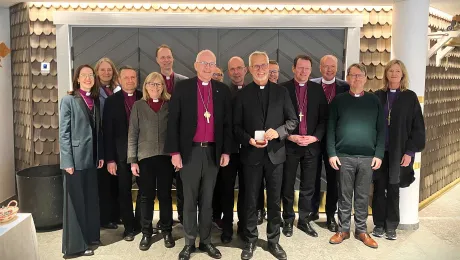”What the world needs is a complete phase-out of fossil fuels” – as COP28 draws to a close, LWF delegates reflect on their climate engagement and the work ahead both at the global level and in building momentum for climate justice among local communities around the world.
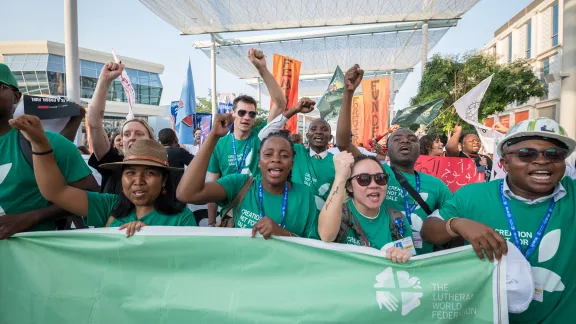
9 December 2023, Dubai, United Arab Emirates: LWF delegates to COP28 pictured during a Global March for Climate Justice at the United Nations climate summit COP28. Photo: LWF/Albin Hillert
LWF delegates urge action, share vision as COP28 draws to a close
(LWI) - A fortnight of negotiations, 170 world leaders, 110,000 total participants, and a venue full of constructed messages: “Think without limits,” “Let’s be bold,” “Let’s act now.”
As the United Nations climate summit COP28 draws to a close, key questions remain unresolved about how the global community will grapple with a crisis that already affects millions of people around the globe directly, and which risks escalating beyond a range of tipping points in the next few years if urgent action is not undertaken.
While the conference’s president Dr. Sultan Al Jaber opened the second week of negotiations with the claim that COP28 had built “unprecedented momentum,” key issues have continued to prove difficult to resolve – such as the need for commitments to fill the newly established Loss and Damage Fund, or formulations on how the world will deal with a fossil fuel industry currently causing emissions far beyond what is sustainable for the goals of the Paris Agreement of COP21 to remain viable.
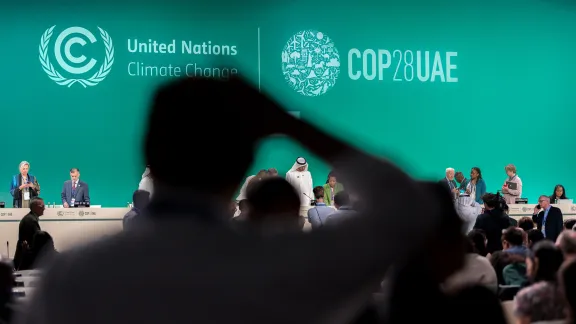
8 December 2023, Dubai, United Arab Emirates: Sultan bin Ahmed Al Jaber, COP28 President, pictured as the high level segment resumes for the second half of negotiations at the United Nations climate summit COP28. Photo: LWF/Albin Hillert
The process for a global stocktake vis-a-vis the Paris Agreement – a center point for this year’s COP – has made clear the need to scale up ambitious action for climate justice.
“The next two years are crucial,” said UN secretary general António Guterres in addressing the media on 11 December. “Countries must leave this COP with a clear understanding of what needs to be done between now and COP30 in Brazil,” he said.
“While there have been initial commitments to the now operationalized Loss and Damage Fund, a mechanism for which the LWF has advocated for many years, so far we have pledges of up to $700 million, which is less than 1% of what is needed to support people facing the greatest challenges from the impacts of climate change. And more importantly, the mechanism for accessing the funds is still unclear,” said LWF program executive for climate justice Elena Cedillo as negotiations moved into their final days.
As for the issue of fossil fuels, for the LWF it is clear: “What the world needs is a complete phase-out of fossil fuels in line with the Paris Agreement goals. The inclusion of new language in the current text of the GST is simply a way to delay necessary decisions.,” Cedillo said as the proposal for a final text was presented by the presidency on 11 December.
“We cannot end with a text of only recommendations and weak decisions, we need to see ambitious commitments,” she added.
A future of climate justice
Young LWF delegates from all regions of the global communion have participated in COP28, bringing to the table their experiences as climate champions in diverse communities across the globe.
As COP28 approaches its finish line, they look ahead beyond the negotiation table to reflect on what is needed to build a future of climate justice rather than climate disaster, and what currently gives them hope.
“Intergenerational justice is a key issue for climate justice – every generation and every country need to be involved,” said LWF delegate Fan Ho Yin of the Evangelical Lutheran Church of Hong Kong.
Her words are echoed by Liza Funete of the Evangelical Lutheran Church in Zambia, who stresses the need for climate change education of young and old alike.
“For me the most important topic is education and awareness. It is important to raise more knowledge about climate change, because as young people, this issue will inevitably affect us,” Funete said.
Savanna Sullivan, LWF program executive for youth, notes that the LWF to this day continues to play a quite unique role in including young people in the global space of COP.
“The world, and the COP, must acknowledge that not only does climate change disproportionately affect young people, but that our conversations about justice are incomplete without the creativity and wisdom of every generation - including youth. Our faith calls our churches to set an example in this,” she says.
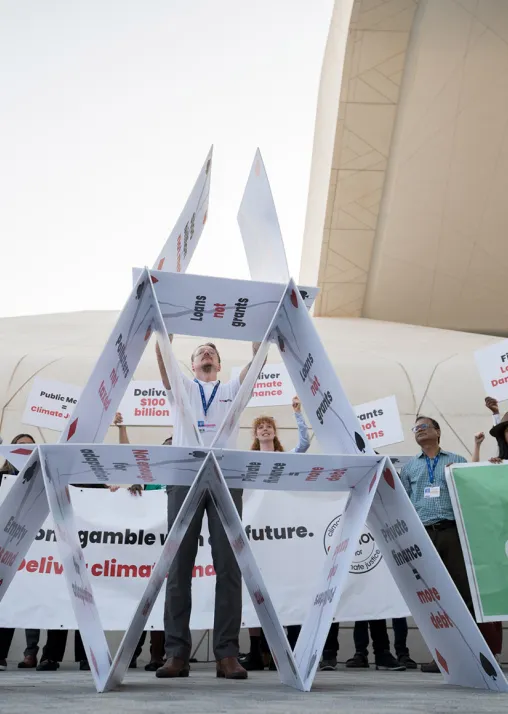
8 December 2023, Dubai, United Arab Emirates: Delegates from the Lutheran World Federation, ACT Alliance, Christian Aid and other Christian traditions gather for a public advocacy action at COP28, highlighting that any false solutions for the climate will crumble like a house of cards. Photo: LWF/Albin Hillert
Speaking from his perspective as youth coordinator of the Evangelical Church of the River Plate in Argentina, Uruguay and Paraguay, Mateo Gabriel Fischer says he still has hope that transitions will be possible across various dimensions including the current carbon footprints of major cities, deforestation and building sustainably agricultural practices, as well as the transition into clean energy sources.
“My dream is that we can achieve climate justice in a world where we do not leave a harmful footprint on our environment, and where we can all live and be included, with gender justice, justice for indigenous peoples, and for people in all their diversity,” Fischer reflects.
And for Maro Micah Maua of the Kenya Evangelical Lutheran Church – attending his second consecutive COP – the question of climate justice is existential: “Our churches are part of our broader communities, and this crisis is affecting us right now. There is no future without climate justice. And there is no climate justice without gender justice, or without intergenerational justice.”
“Climate justice means a just world for all the people, across all divides in this planet,” he concludes.
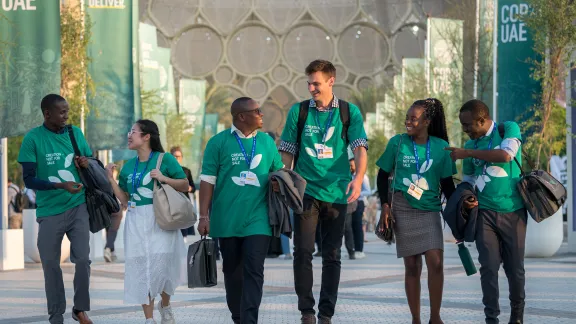
LWF delegates pictured at the United Nations climate summit COP28, an opportunity for the young people to grow spiritually, practice leadership skills, and to engage in climate change-related decision-making. Photo: LWF/Albin Hillert
The LWF participates in the 28th UN Climate Change Conference (COP28), which takes place in Dubai, United Arab Emirates, from 30 Nov - 12 Dec 2023. This engagement is part of the communion’s ongoing focus on strengthening climate action and advocacy at all levels. Young people are vital agents of change and form a greater part of the LWF’s delegation to COP28.
